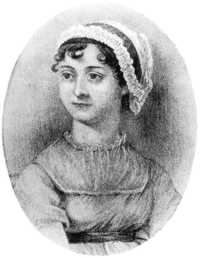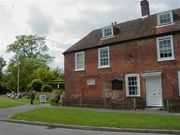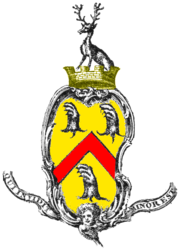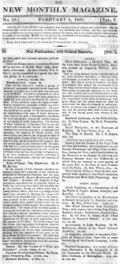Jane Austen
2007 Schools Wikipedia Selection. Related subjects: Writers and critics
 Jane Austen, in a portrait based on one drawn by her sister Cassandra. |
|
| Born: | 16 December 1775 Steventon, Hampshire, England |
|---|---|
| Died: | 18 July 1817 Winchester, Hampshire, England |
| Occupation(s): | Novelist |
Jane Austen ( 16 December 1775 – 18 July 1817) was an English novelist. Her insights into women's lives and her mastery of form and irony have made her one of the most noted and influential novelists of her era despite being only moderately successful during her lifetime.
Life
In 1775, Jane Austen was born at a rectory in Steventon, Hampshire, one of two daughters of the Rev. George Austen (1731–1805) and his wife Cassandra (née Leigh) (1739–1827). Her brothers James and Henry followed in the path of their father and joined the clergy (the latter towards the end of his life after a successful career as a banker), while Francis and Charles both pursued naval careers. She also had a sister, Cassandra, with whom she maintained a close relationship throughout her life. The abundant correspondence between the sisters provides historians with the greatest insight into Austen's past. The only undisputed portrait of Jane Austen is a somewhat rudimentary coloured sketch done by Cassandra, which currently resides in the National Portrait Gallery, London. In 1783, she was educated briefly by a relative in Oxford, then in Southampton, and finally in 1785–1786 attended the Reading Ladies boarding school in the Abbey gatehouse in Reading, Berkshire. This uncommonly advanced level of education may have contributed to her early proclivity towards writing, and she began her first novel in 1789. This was also due to her family life, though. The Austen family often enacted plays, which gave Jane an opportunity to present her stories. They also rented novels out of the local library, which influenced Austen's writings. She was encouraged to write especially by her brother Henry, who wrote a little himself.
Austen's life was even less eventful than that of her characters. In 1801 the family moved to the socially esteemed spa city of Bath, which provides the setting for many of her novels; though Jane Austen, like her character Anne Elliot, seemed to have "persisted in a disinclination for Bath", although her dislike may have been influenced by the family's precarious financial situation in that city. In 1802 Austen received a marriage proposal from a wealthy but "big and awkward" man named Harris Bigg-Wither, who was six years her junior. Such a marriage would have freed her from some of the constraints and dependency then associated with the role of a spinster. Such considerations may have influenced her initially to accept his offer, only to change her mind and refuse him the following day. It seems clear that she did not love him. After the death of her father in 1805, Austen, her sister, and her mother lived in Southampton with her brother Frank and his family for several years before moving to Chawton in 1809. Here her wealthy brother Edward had an estate with a cottage, where he allowed his mother and sisters to live. This home is now a museum and is a popular site for tourists and literary pilgrims alike.
Austen lived at Chawton, and wrote her later novels there. In 1816, she began to suffer from ill-health. In May 1817 she moved to Winchester to be closer to her doctor. It is now thought by some that she may have suffered from Addison's disease, a failure of the adrenal glands that was often caused by tuberculosis. The disease was at that time unnamed. Others, such as one of her biographers, Carol Shields, have hypothesized that she died from breast cancer. Her condition became increasingly unstable, and on July 18, 1817 she died at the age of forty-one and was buried in Winchester Cathedral.
Work
Austen's best-known work is Pride and Prejudice, which is viewed as an exemplar of her socially astute comedies of manners. Austen also wrote a satire of the popular Gothic novels of Ann Radcliffe, Northanger Abbey, which was published posthumously.
Adhering to a common contemporary practice for female authors, Austen published her novels anonymously; her anonymity kept her out of leading literary circles.
Austen's comedies of manners, especially Emma, are often cited for their perfection of form. Modern critics continue to unearth new perspectives on Austen's keen commentary regarding the predicament of unmarried genteel English women in the late 1790s and early 1800s, a consequence of inheritance law and custom, which usually directed the bulk of a family's fortune to eldest male heirs.
Although Austen's career coincided with the Romantic movement in literature, she was not an intensely passionate Romantic. Passionate emotion usually carries danger in an Austen novel: the young woman who exercises twice a day is more likely to find real happiness than one who irrationally elopes with a capricious lover. Austen's artistic values had more in common with David Hume and John Locke than with her contemporaries William Wordsworth or Lord Byron. Among Austen's influences were Samuel Johnson, William Cowper, Samuel Richardson, George Crabbe and Fanny Burney.
Although Austen did not privilege passionate emotion as did other Romantic movement writers, she was also skeptical of its opposite -- excessive calculation and practicality often leads to disaster in Austen novels.
Criticism
Austen's novels received only moderate renown when they were published, though Sir Walter Scott in particular praised her work:
- "That young lady has a talent for describing the involvements of feelings and characters of ordinary life which is to me the most wonderful I ever met with."
In Austen's final novel Persuasion, several characters read a work by Scott and praise it, but Marianne Dashwood in " Sense and Sensibility" had already counted Scott as one of her favorites.
Austen also earned the admiration of Macaulay (who thought that in the world there were no compositions which approached nearer to perfection), Samuel Taylor Coleridge, Robert Southey, Sydney Smith, Edward FitzGerald, and the Prince Regent, who even managed to get her to visit him at Brighton. Twentieth century scholars rank her among the greatest literary geniuses of the English language, sometimes even comparing her to Shakespeare. Lionel Trilling and Edward Said have both written treaties on Austen's works. Said referred extensively to Mansfield Park in his 1993 work, Culture and Imperialism.
Trilling wrote in an essay on Mansfield Park:
"It was Jane Austen who first represented the specifically modern personality and the culture in which it had its being. Never before had the moral life been shown as she shows it to be, never before had it been conceived to be so complex and difficult and exhausting. Hegel speaks of the "secularization of spirituality" as a prime characteristic of the modern epoch, and Jane Austen is the first to tell us what this involves. She is the first novelist to represent society, the general culture, as playing a part in the moral life, generating the concepts of "sincerity" and "vulgarity" which no earlier time would have understood the meaning of, and which for us are so subtle that they defy definition, and so powerful that none can escape their sovereignty. She is the first to be aware of the Terror which rules our moral situation, the ubiquitous anonymous judgment to which we respond, the necessity we feel to demonstrate the purity of our secular spirituality, whose dark and dubious places are more numerous and obscure than those of religious spirituality, to put our lives and styles to the question ..."
Negative views of Austen have been notable, with more demanding detractors frequently accusing her writing of being unliterary and middle-brow. Charlotte Brontë criticized the narrow scope of Austen's fiction:
- "Anything like warmth or enthusiasm, anything energetic, poignant, heartfelt, is utterly out of place in commending these works: all such demonstrations the authoress would have met with a well-bred sneer, would have calmly scorned as 'outré' or extravagant. She does her business of delineating the surface of the lives of genteel English people curiously well. There is a Chinese fidelity, a miniature delicacy, in the painting. She ruffles her reader by nothing vehement, disturbs him with nothing profound. The passions are perfectly unknown to her: she rejects even a speaking acquaintance with that stormy sisterhood ... What sees keenly, speaks aptly, moves flexibly, it suits her to study: but what throbs fast and full, though hidden, what the blood rushes through, what is the unseen seat of life and the sentient target of death--this Miss Austen ignores....Jane Austen was a complete and most sensible lady, but a very incomplete and rather insensible (not senseless) woman, if this is heresy--I cannot help it."
Mark Twain's reaction was revulsion:
- "Jane Austen? Why, I go so far as to say that any library is a good library that does not contain a volume by Jane Austen. Even if it contains no other book."
But Rudyard Kipling felt differently, going so far as to write the short story "The Janeites" about a group of soldiers who were also Austen fans, as well as two poems praising "England's Jane" and providing her with posthumous true love.
Austen's literary strength lies in the delineation of character, especially of women, by delicate touches arising out of the most natural and everyday incidents in the life of the middle and upper classes, from which her subjects are generally taken. Her characters, though of quite ordinary types, are drawn with such firmness and precision, and with such significant detail as to retain their individuality intact through their entire development, and they are uncoloured by her own personality. Her view of life seems largely genial, with a strong dash of gentle but keen irony.
Some contemporary readers may find the world she describes, in which people's chief concern is obtaining advantageous marriages, unliberated and disquieting. In her era options were limited, and both women and men often married for financial considerations. Female writers worked within the similarly narrow genre of romance. Part of Austen's prominent reputation rests on how well she integrates observations on the human condition within a convincing love story. Much of the tension in her novels arises from balancing financial necessity against other concerns: love, friendship, honour and self-respect. It is also important to point out that, at the time, romance novels were seen as a clever modern variation on the knightly romances of medieval times; these were damsels engaged in adventure, seeking their fortunes and carrying out quests.
There are two museums dedicated to Jane Austen. The Jane Austen Centre in Bath is a public museum located in a Georgian House in Gay Street, just a few doors down the street from number 25 where Austen stayed in 1805. The Jane Austen's House Museum is located in Chawton cottage, in Hampshire, where Austen lived from 1809 to 1817.
Filmography
In popular culture, Austen's novels have been adapted in a great number of film and television series, varying greatly in their faithfulness to the originals. Pride and Prejudice has been the most reproduced of her works, with six films, the most recent being the 2005 adaptation directed by Joe Wright, starring Keira Knightley (Elizabeth Bennett), Donald Sutherland (Mr. Bennett), Matthew Macfadyen (Mr. Darcy), and Dame Judi Dench (Lady Catherine de Bourgh), as well as the 2004 Bollywood adaptation Bride & Prejudice. There is also a 1940 film version of the novel starring Laurence Oliver as Mr. Darcy, and Greer Garson as Elizabeth Bennett. Previously, there were five television series produced by the BBC, the most noteworthy being the well-loved 1995 version, starring Colin Firth and Jennifer Ehle. The 2001 film Bridget Jones's Diary included characters and plot line inspired by the novel, though it is to be noted that this movie was based on a novel by Helen Fielding.
Emma has been adapted on television several times, first in 1948. Recent versions include a 1972 British television version, the 1996 film Emma, with Gwyneth Paltrow and Jeremy Northam, and also in 1996 on British television with Kate Beckinsale. The 1995 film Clueless, directed by Amy Heckerling and starring Alicia Silverstone, is a modernization of Emma in a California high school setting.
Sense and Sensibility has been made into four films including the 1995 version, from a screenplay adapted by Emma Thompson (who won the Academy Award for Best Adapted Screenplay); it was directed by Ang Lee and starred Thompson and Kate Winslet. Persuasion has been adapted into two television series and one feature film. Mansfield Park and Northanger Abbey have both been made into films. The 1980 film Jane Austen in Manhattan is about rival stage companies who wish to produce the only complete Austen play "Sir Charles Grandison" (from the Richardson novel of the same title), which was rediscovered in 1980.


